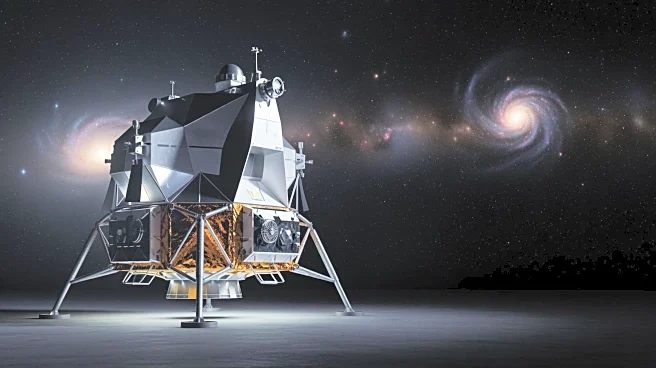What's Happening?
NASA has expressed concerns over SpaceX's progress on the Artemis 3 lunar-landing mission, citing delays in the development of the Starship Human Landing System (HLS). Originally scheduled for 2027, the mission is now
expected to be postponed to 2028. NASA's acting administrator, Sean Duffy, confirmed that SpaceX is behind schedule, which has led the agency to reopen parts of the contract to potentially include additional partners. This strategic move aims to ensure the United States can return astronauts to the Moon before China's space agency achieves its own crewed Moon landing, planned for before 2030. SpaceX was awarded a $2.89 billion contract to develop the lunar lander, but key milestones remain incomplete, raising concerns about meeting the timeline.
Why It's Important?
The delay in the Artemis 3 mission has significant implications for U.S. space exploration and geopolitical positioning. With China's space agency planning a crewed Moon landing before 2030, NASA faces increased pressure to maintain its leadership in space exploration. The reopening of the lander contract to new bidders, including companies like Blue Origin, reflects NASA's need to mitigate risks and ensure backup options. This development underscores the competitive nature of international space exploration and the strategic importance of establishing a sustainable human presence on the Moon. The outcome of this situation could influence future collaborations and funding within the U.S. space industry.
What's Next?
NASA's decision to reopen the Artemis 3 lander contract suggests potential involvement of other companies, such as Blue Origin, to propose alternative systems or faster delivery schedules. This move aims to maintain flexibility and reduce risk while keeping SpaceX as a key partner. The agency must balance engineering challenges with political expectations, as Congress and international partners closely monitor the program's progress. SpaceX continues to test and refine its Starship system, with upcoming phases focusing on proving the ability to refuel Starship in Earth orbit, a critical requirement for lunar missions. The next few months will be crucial in determining whether NASA's ambitious lunar timeline can be met.
Beyond the Headlines
The reopening of the Artemis 3 contract highlights the broader geopolitical stakes involved in lunar exploration. As China accelerates its space program, the U.S. must navigate technical challenges and international competition to secure resource-rich areas of the lunar surface. This situation emphasizes the importance of innovation and competition in maintaining U.S. dominance in space exploration. The Artemis program's success could have long-term implications for international collaborations and the future of space policy.










